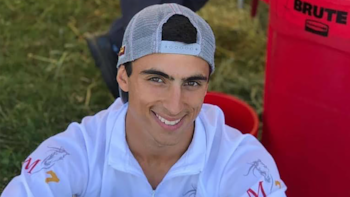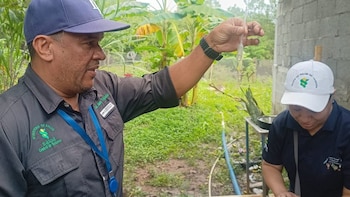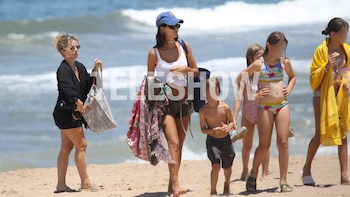
The selection of a new Olympic host city generates worldwide interest and speculation. Michael Pirrie, a founding member of London’s bid of the 2012 Games, looks at the elusive critical success factors behind Brisbane’s preferred nomination for the 2032 Olympics.
The art of calling an Olympic Games host city contest can be cloaked in mystery and fraught with uncertainty - like picking the winning lottery ticket numbers or first wisps of white smoke signaling a new Pope.
Vast amounts of time, energy and resources have been invested by many aspiring Olympic cities and nations to assemble a successful Olympic bid or candidacy.
The pending announcement of a new Olympic host city attracts world attention and renewed speculation on the winning formula and factors.
Most campaigning cities invariably believe they have the successful combination. While many factors can play a role, only a few really matter or make a difference.
Brisbane had the elusive elements that make preferred host city nomination more than a random choice or date with destiny.
While a new host city selection process is now in place, many of the critical success factors underpinning previous successful bids were also highly influential in Brisbane’s nomination.
I saw those factors up close and in full force working for London on the great race for the 2012 Olympic Games, eventually won by the British capital following a landmark three year global contest involving an unprecedented cavalcade of cities – Paris, New York, Moscow, Madrid and London.
Successful Olympic Games depends on reliability and predictability in timing and planning.
The key challenge facing the IOC Executive Board for 2032 was choosing the city that offered most stability and security for the global Olympic Games event in the looming decade of uncertainty ahead.
London’s bid centered on how it would advance the Olympic Movement: delivering an electrifying host city experience for athletes; inspiring young people; and regenerating disadvantaged communities.
Brisbane’s capacity to advance and strengthen the Olympic Movement, in the radically different circumstances of COVID, also was fundamental to its nomination.
CRITICAL SUCCESS FACTORS
Like the London bid, which was expertly counseled by the British Olympic Association chaired by senior IOC member Sir Craig Reedie, Brisbane was guided by the high performing Australian Olympic Committee.
This was critical for Brisbane in order to understand what was important for NOCs, IFs and the wider Olympic Movement in planning for 2032.
Leadership was absolutely critical to the success of both London and Brisbane.
In London, along with Sir Keith Mills, a world marketing leader with deep belief in sport, we had Seb Coe, the highly decorated and respected world and Olympic running champion with an intuitive understanding of international sport and politics.
Coe’s reassuring leadership generated compelling credibility and confidence in London.
Brisbane had highly respected champion of Olympic sports administrator and senior IOC Games strategist, John Coates, who helped to design the blueprint for the contemporary Games era as architect of the iconic Sydney 2000 Games.
As executive adviser for the London Olympic Games organizing committee, I saw Coates also play a key role in the universally acclaimed London Olympics through his work on the IOC’s high level planning coordination commission, along with Denis Oswald, Gilbert Felli, Gunilla Lindberg and others.
Coates’s vast experience and understanding of complex Olympic Games operations, stakeholder priorities and involvement as Australia’s senior IOC member generated Coe-like confidence for Brisbane.
NEW GAMES FOCUS
Brisbane also had Olympic Games technical expert Craig McLatchey leading the vital 2032 master planning process.
This focused on fitting the Olympic Games to the contours of the city through extensive temporary adaptation of existing venues and infrastructure for Olympic events to minimize costs.
New infrastructure, services and facilities needed to develop the rapidly growing Brisbane and southeast Queensland region preferred for the Games would also be used in the short term to help host the Olympics.
This would result in new jobs, economic growth and community benefits as part of Australia’s wider recovery from the pandemic.
Government and national support are highest level success factors
This support was demonstrated for London through the involvement of British Prime Minister Tony Blair and dynamic Minister for Culture, Media and Sport and Olympic bid, the late Tessa Jowell.
Similar support for Brisbane came through constant government contact and discussions with the IOC. This culminated in a strategically and symbolically important meeting between IOC President Thomas Bach and Australian Prime Minister Scott Morrison, who expressed full support for the Brisbane Games.
FUTURE PROOFING THE GAMES: THE BRISBANE BUBBLE
Brisbane is the first city preferred for the COVID era.
After Australia flattened the virus through early border closures, lockdowns, extensive testing, contact tracing and quarantine, Brisbane hopes to fast track its region, economy, profile and future through the Olympic Games as a project of national and international significance while the world slowly recovers.
With Australia’s sophisticated internal defense, intelligence and rapid response emergency services and systems, advanced medical and hospital facilities, communications technology, and mature sports marketing culture, Brisbane also provides a unique opportunity to future-proof the Olympics against sudden new threats.
Australia also rests in geopolitically stable Oceania, distant from most volatile world regions that can endanger major sporting events. These have included the Gulf blockade that threatened to isolate the pre-pandemic Doha 2019 World Athletics championships.
Australia’s history as a nation that does what it says was also critical.
The recent Australian Open tennis Grand Slam was the first major international sporting event of the pandemic with large numbers of spectators; not a single case of infection was detected or linked to the event or wider community.
Speaking at the Grand Slam, tennis superstar, Rafael Nadal said: "The country is doing great with the pandemic. Australia is probably one of the best examples in the world with how they react to these very challenging times."
The future of the Olympic Movement depends on the future of the Olympic Games, and Brisbane’s nomination marks the next stage in the evolution of the vital host city selection process.
As the 2032 preferred city nomination deadline approached, a consensus of support coalesced amongst EB members that Brisbane could best meet the most pressing needs of the Games in turbulent times – stability, safety, and flexibility.
Support also formed among key stakeholders and partners, including athletes and NBC, that Brisbane offered the safest environment for Olympic sport and a rich global broadcast and digital experience of the Games.
NEW CONSOLIDATION ERA
The message from Brisbane’s nomination is that this is a time for consolidation in the Olympic Movement; a time for prudence, probity and risk minimization in the selection of host cities.
The era of expansion and experimentation that led to Rio and Sochi is over.
The further migration of the Olympic Games up the east coast of Australia to Brisbane is a journey towards that safety and stability.
Brisbane follows Olympic Games stop overs in Melbourne and Sydney in a nation with some of the world's best sports venues and support services located in nearby coastal cities.
These will support Olympic training and qualifying for Brisbane and provide enormous redundancy as potential reserve venues if necessary.
OLYMPIC CIRCUIT BREAKER
The IOC faced a make or break decision as the new year dawned with the next two Olympic cities in Tokyo and Beijing again in the grip of the pandemic.
A climate of fear and uncertainty had engulfed the world and Olympic Movement in the wake of the pandemic and postponement of Tokyo.
Preparations for Games scheduled later in the decade in Paris and Los Angeles also were challenged as COVID continued to threaten France and US and other nations.
This was creating deep uncertainty over future prospects and options for the Games as the IOC sought to determine where the Olympics belonged in a rapidly changing world of growing social, economic and political unrest.
This included international calls for a boycott of next year’s Beijing Games over human rights concerns; also China’s initial notification of COVID cases to the international community as the virus began its global killing spree shutting down sport worldwide.
Brisbane provides a much needed COVID circuit breaker.
SECOND CITIES
With so much virus still circulating in the world’s super cities and sports capitals from London and New York to Moscow, Brisbane opens up a new tier of second or midsized cities to follow in the footsteps of Barcelona’s spectacular success as a smaller Olympic city.
Brisbane’s regional Games model also will help to pave the way for Budapest and Doha and other smaller cities as alternatives to traditional major cities in globally troubled times.
CONCLUSION
Unlike any previous Olympic city selection cycle, the pandemic has emerged as the most important new factor in deciding Games locations.
The Olympic Movement can’t afford another Games postponement. Until the full impact of vaccines and new medications on transmission and new variants can be properly assessed, the capacity of cities and nations to control virus levels will be essential to selecting hosts.
OLYMPIC OASIS
Brisbane and Australia provide a hub of stability and safety where the Olympic Games can adapt to current and new challenges in the decade ahead.
Australia is a location where the Games can belong and feel at home in a nation with a mythical connection to sport, filling the 115,000 Sydney 2000 Olympic stadium – the biggest in history - night after night and day after day.
Australia has long basked in the glow of its goldfields, wheat farms, surf beaches, amber beer, coastal culture and Olympic gold medals.
Brisbane’s golden landscapes for sport, after suppressing the virus to near zero daily new cases, offer light and hope in dark pandemic times.
Michael Pirrie led London's global media campaign for the 2012 Olympic Games and was a founding member of the highly regarded bid, and has worked on several Olympic and major event campaigns and committees.
For general comments or questions,click here.
Your best source of news about the Olympics is AroundTheRings.com, for subscribers only.
Últimas Noticias
Sinner-Alcaraz, the duel that came to succeed the three phenomenons
Beyond the final result, Roland Garros left the feeling that the Italian and the Spaniard will shape the great duel that came to help us through the duel for the end of the Federer-Nadal-Djokovic era.
Table tennis: Brazil’s Bruna Costa Alexandre will be Olympic and Paralympic in Paris 2024
She is the third in her sport and the seventh athlete to achieve it in the same edition; in Santiago 2023 she was the first athlete with disabilities to compete at the Pan American level and won a medal.

Rugby 7s: the best player of 2023 would only play the medal match in Paris
Argentinian Rodrigo Isgró received a five-game suspension for an indiscipline in the circuit’s decisive clash that would exclude him until the final or the bronze match; the Federation will seek to make the appeal successful.

Rhonex Kipruto, owner of the world record for the 10000 meters on the road, was suspended for six years
The Kenyan received the maximum sanction for irregularities in his biological passport and the Court considered that he was part of a system of “deliberate and sophisticated doping” to improve his performance. He will lose his record and the bronze medal at the Doha World Cup.

Katie Ledecky spoke about doping Chinese swimmers: “It’s difficult to go to Paris knowing that we’re going to compete with some of these athletes”
The American, a seven-time Olympic champion, referred to the case of the 23 positive controls before the Tokyo Games that were announced a few weeks ago and shook the swimming world. “I think our faith in some of the systems is at an all-time low,” he said.




